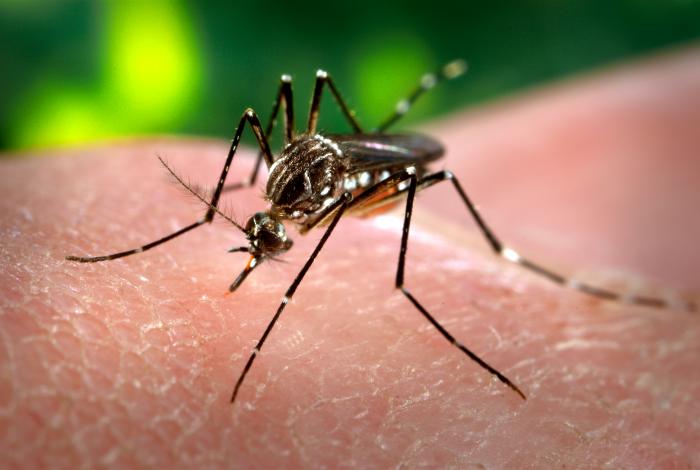Zika Virus: What You Need to Know
Until recently, Zika was an obscure virus, confined to equatorial Africa and Asia, and only known to specialists in tropical medicine.

Aedes aegypti, by James Gathany // Public Domain
To get you caught up, Zika virus was first discovered – or stumbled upon, might be more accurate – in monkeys by scientists studying yellow fever in the Zika Forest of Uganda in 1947. They weren’t even sure it could be passed to humans until 5 years later, and didn’t determine it was passed by mosquitos until 5 years after that.
Since then, outbreaks of Zika virus disease have been recorded in Africa, Asia and the Pacific. Then, last spring, Zika appeared in South America, where it has (so far) infected more than 1 million Brazilians, and been tentatively linked to a steep increase in the number of babies born with a very serious health condition called microcephaly.
Following an emergency meeting February 1, 2016, The World Health Organization has declared,
“…The recent cluster of microcephaly cases and other neurological disorders reported in Brazil, following a similar cluster in French Polynesia in 2014, constitutes a Public Health Emergency of International Concern.”
Here’s what you need to know.
Zika virus is transmitted by mosquitoes.
The virus is transmitted to people through the bite of an infected mosquito that are mainly found in tropical regions, though the mosquito’s range stretches from South America to the U.S. border with Canada. These are the same mosquitos that transmit dengue, chikungunya and yellow fever.
It can also be transmitted sexually.
There is one well-documented case in which Zika was sexually transmitted in 2008, and the CDC has confirmed the first U.S. case of Zika virus infection in someone that had not been to an infected region was sexually transmitted from someone who had.
.@GlobalMomsChall Sexual transmission of Zika virus is possible, but mosquito bites remain primary way #Zika is transmitted. #CDCchat
— CDC (@CDCgov) February 12, 2016
Bottom line? Use condoms.
80% of those infected never know they have the disease.
Symptoms of the Zika virus disease are similar to a flu, and include mild fever, headache, skin rash, muscle and joint pain, pink-eye and a general feeling of discomfort that may last for two to seven days.
Well, that’s not so bad… right?
You’re right! In fact, if it weren’t for a strong suspicion of a link to very two specific conditions, this outbreak would not be worthy of much attention at all.
From 2014 to 2015, Brazilian health authorities have reported an almost 300% increase in the number of babies born with birth defects known as microcephaly— a condition in which a baby is born with an abnormally small head and brain.
Since November, 5% of microcephaly cases have a confirmed link to the Zika virus, though the World Health Organization suspects that the two are more closely linked, and authorities are investigating another 3,670 suspected cases.
It is also believed to trigger a neurological autoimmune disorder called Guillain-Barre syndrome, in which the immune system attacks the myelin lining of nerve cells, resulting in widespread weakness and paralysis.
There is no specific treatment or vaccine currently available.
The Zika virus has been low on science’s list of priorities since its discovery 50 years ago. The National Institutes of Health has issued a call to the research community that it is looking to fund vaccine development, though that may take several years to pay off.
People sick with the Zika virus are advised to get plenty of rest and drink lots of fluids. Fever and pain can be treated with common medicine but patients are advised to seek medical attention if symptoms worsen.
Additionally, those infected with Zika virus should be extra-stringent regarding their mosquito regimen – they are now carriers – as mosquitos can pass the virus to other people.
The best prevention is protection against mosquito bites.
About 200 million Americans—more than 60 percent of the population—reside in areas of the United States that might be conducive to the spread of Zika virus. With summer coming, the best way to prevent the Zika virus is a thorough anti-mosquito regimen, including:
- checking and repairing all window and door screens
- wearing repellant and long sleeved-clothes,
- and getting rid of mosquito breeding sites, such as rain barrels, bird baths and other sources of stagnant water.
At this time, the Centers for Disease Control recommend that pregnant women consider postponing travel to areas where the Zika virus has been identified.
The scariest thing about Zika virus is how much we don’t know
.@IDCareLive Zika was first found in Africa in 1947. Few cases have occurred prior to this outbreak. A lot we still don't know. #CDCchat
— CDC (@CDCgov) February 12, 2016